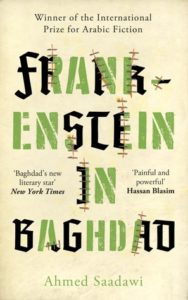 Title: The Impostor (Goodreads)
Title: The Impostor (Goodreads)
Author: Javier Cercas
Translator: Frank Wynne
Published: MacLehose Press, 2014
Pages: 430
Genres: Historical Fiction
My Copy: eBook
Buy: Amazon, Book Depository, Kindle, Wordery (or visit your local Indie bookstore)
Longlisted for the Man Booker International Prize 2018
One of the problems I faced with reading the entire Man Booker International longlist is that the judges tended to pick similar types of books. This year there was a real focus on novels that blurred the line between fiction and memoir. This means that some of the picks felt too similar. Take for example, The Imposter by Javier Cercas (translated by Frank Wynne), which I read right after reading Like a Fading Shadow by Antonio Muñoz Molina which was translated by Camilo A. Ramirez. Both books seem to be a hybrid that deal with real historical events as well as the author’s life.
The Imposter is centred on Enric Marco, a man who claimed he was a prisoner in Nazi German concentration camps Mauthausen and Flossenbürg during World War II. He was awarded the Creu de Sant Jordi (one of the highest civil distinction awards) by the Catalan government, as well as writing a book about his experience. He even became the president of Spain’s leading Holocaust survivor movement. However, it was a lie, in which he responded by saying “I am an impostor, but not a fraud”. A decade later Javier Cercas is investigating Spanish history and then looks into the impact Enric Marco had on the world.
This is a look into human nature and self-deception, while a fascinating concept, this just fell flat for me. This was one of the books I was looking forward to reading on the longlist. The idea of digging yourself into such a lie fascinated me. I truly think I picked this one at the wrong time. It became a struggle to read and I am unable to tell if it was the book itself or the timing. Both The Imposter and Like a Fading Shadow just blended together completely.
I am really unsure if I will re-read this book at a future date, but it has made me rethink reading the Man Booker International longlist in the future. Ideally, I would have read a few of the books on the long list before it is announced. I am getting more and more into books in translations and I hope in 2019 when the longlist is announced I will already have some of the books crossed off. Have you had this experience before? For those who have read this one, is it just a case of bad timing? I am curious to know from others.

 Title: Flights (
Title: Flights ( Title: Like a Fading Shadow (
Title: Like a Fading Shadow ( Title: Vernon Subutex, 1 (
Title: Vernon Subutex, 1 ( Title: Frankenstein in Baghdad (
Title: Frankenstein in Baghdad ( Title: The White Book (
Title: The White Book ( Title: The World Goes On (
Title: The World Goes On ( Title: The Stolen Bicycle (
Title: The Stolen Bicycle ( Title: The Dinner Guest (
Title: The Dinner Guest ( Title: Die, My Love (
Title: Die, My Love (